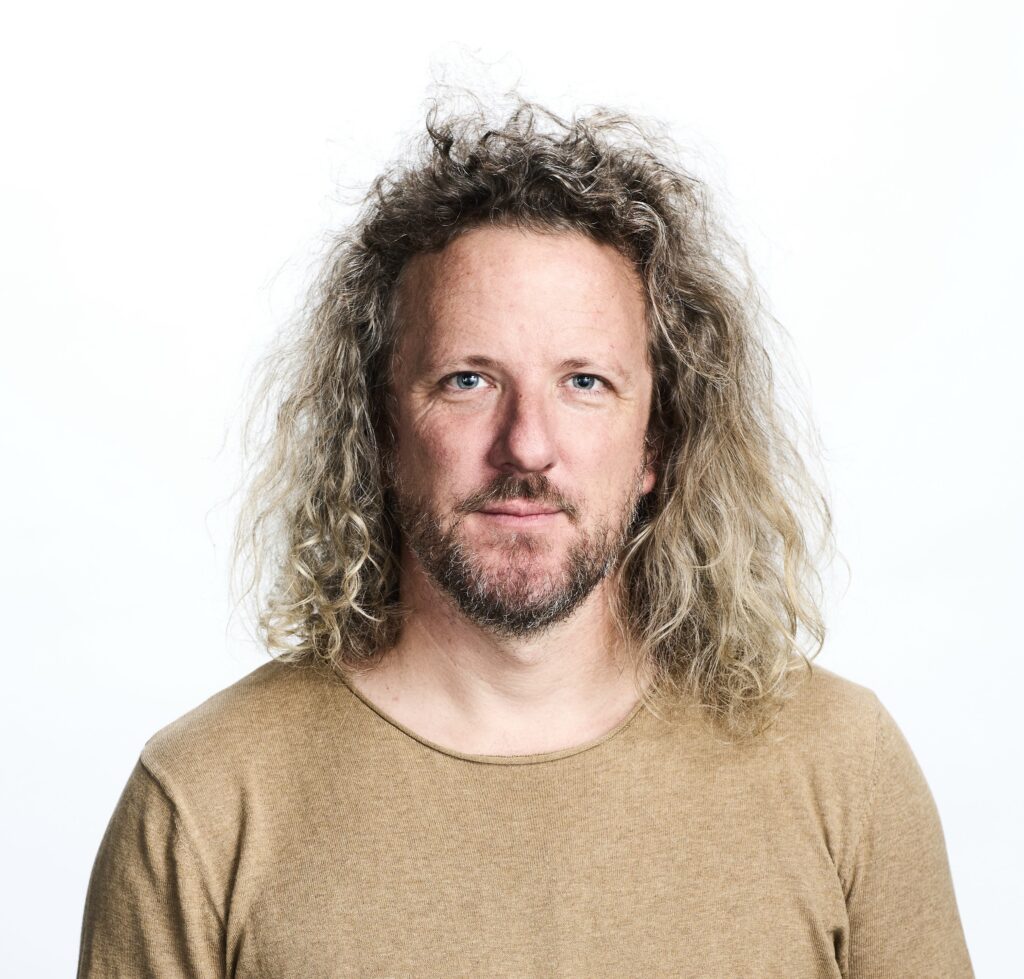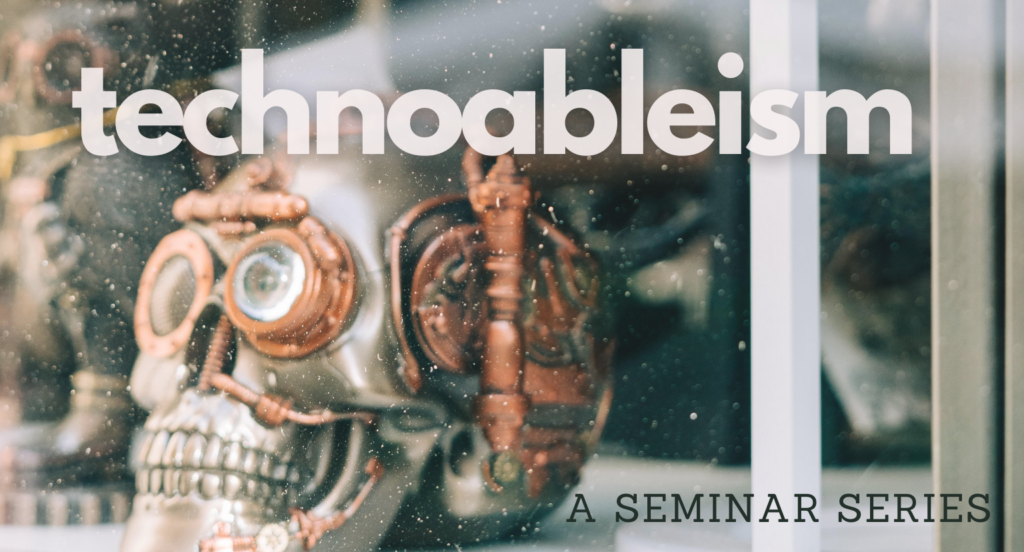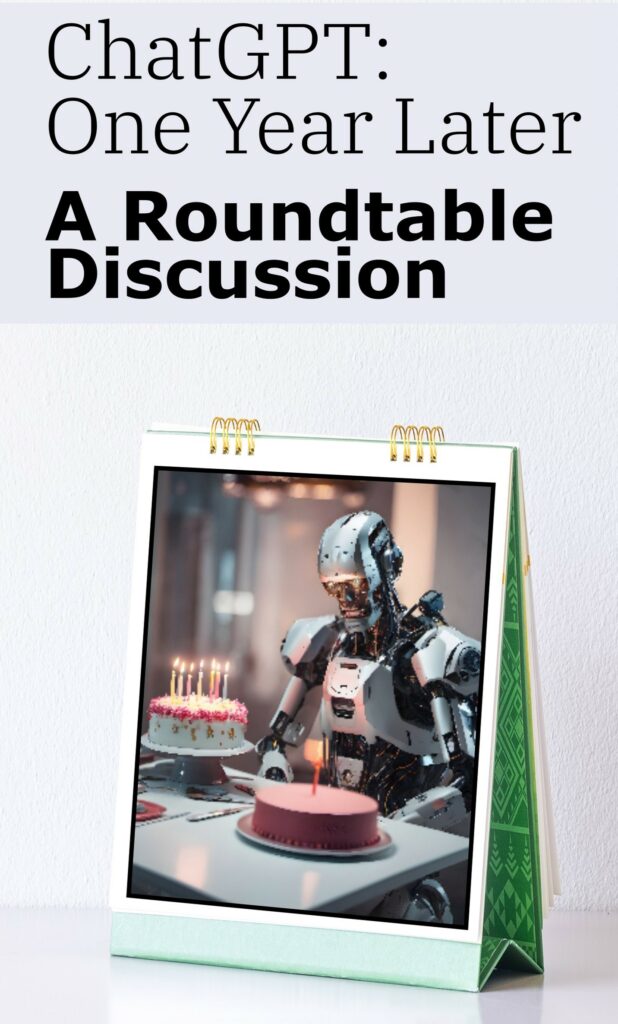Newsletter
The ITS Monthly Newsletter is circulated via email every month. The newsletter includes news, publications, events and other information related to The Institute for Technoscience and Society. To receive the monthly newsletter, sign up for our mailing list .
If you would like to submit a recent publication, event, or other news through our newsletter please complete the Request for information for the ITS Newsletter.
For previous or current newsletters please click on the relevant link below.
Events
Computing the Planet: Images and Imaginaries
Join us for a talk with Michael Richardson on April 23, 2025 2pm - 3pm
Location: 519 Kaneff Tower
Earth is now treated as a computable object in a host of domains. In industry, this manifests in initiatives like Microsoft’s Planetary Computer or Nvidia’s Earth-2. In the military and government, there are digital twins of natural environments such as the European Commission’s Destination Earth and Digital Twin of the Ocean, as well as missile detection systems, and battlespace simulations. In earth systems and climate sciences, there are General Circulation and Coupled Models, among other well-established frameworks. This talk examines images and imaginaries in efforts to compute Earth. What does it mean to say that the planet is computable? What sort of object is a computable planet? And what is at stake in the different paradigms competing in the contemporary moment?
About the Speaker: Michael Richardson is a writer, researcher, and teacher living and working on Gadigal and Bidjigal country in Sydney, Australia. He is an Associate Professor in Media and Culture at the University of New South Wales, Australia, where he co-directs the Media Futures Hub and the Autonomous Media Lab, and an Associate Investigator with the ARC Centre of Excellence on Automated Decision-Making + Society . His research examines technology, power, witnessing, trauma, and affect in contexts of war, security, and surveillance. His latest book is Nonhuman Witnessing: War, Data, and Ecology after the End of the World (Duke University Press, 2024).
Visiting Scholar: Feb-Aug 2025, Technoscientific Pasts & Futures Cluster, visit funded by the Connected Minds initiative.

In Celebration Of Black History Month
Building Black Worlds: Making Black Spaces in Digital Gaming Places
Tuesday, 27th February 2024 @ 1.00-2.30pm
CANCELLED (due to industrial action)
Join us for a talk by Dr. Akil Fletcher (Princeton University). In this talk, Dr. Fletcher will share his new work on Black intermediality, exploring how Black computer game players take existing game environments for their own use, going beyond the intentions of developers to create new social worlds of experience and being.
About the speaker: Dr. Akil Fletcher is an anthropologist who researches race and video games at Princeton University. His work lies on the boundaries of Anthropology, African American Studies, and Game Studies.

Nicholas Surber
Visiting Graduate Student, Institute for Technoscience & Society
PhD Researcher, Division of Science, Technology and Society, Chalmers University of Technology, Gothenburg, Sweden
Who’s who and where: Papers and patents in the evolving European nano-race
NEW DATE! Thursday, 28th September @ 3.00-4.00pm, 305 York Lanes, York University (in-person only)
Nanotechnology can be seen as an example of the ongoing economization of science and technology. Its development has even been characterized as a “nano-race” to a nano-enabled technoscientific future. Bibliometric studies show that the literature focuses on both nanotechnology’s internal (reflexive) and external (societal) consequences, having commenced in the 1990s with a predominant focus on the (positivist) technoscientific content. Using a bibliometric approach, I pivot from ‘content’ (questions of what) to normative issues surrounding justice and safety through two core research questions: who is developing nanotechnology recently in Europe and where (which countries) is this development taking place? These questions are addressed by enlisting multiple Espacenet and Scopus searches of nanotechnology patents and papers in the sample time period (2010-2018) to collect, clean, code, and analyze metadata from the most prolific patent applicants, publishing (paper) institutions, and funding organizations. Normative concerns are highlighted by comparing the four trajectories of (neutral) nanotechnology, the (moot) nanomaterial groups of carbon nanotubes and nano-silver, and with the (good) research area of nanosafety, in terms of individual entries, stakeholder groups and the affiliated European countries. Across these samples, the resulting distributions reveal substantial concentration, especially regarding funders, and significant repetition of applicants, institutions and funders. Instead of seeing precautionary reprioritization away from the moot nanomaterials, nanosafety institutions represent the most divergent inventory, suggesting that longstanding environmental concerns have not disrupted the place of these nanomaterials in the nanotechnology canon. The overarching question of who’s who in nanotechnology thus allows for an assessment not only of who benefits from its development, but of the prioritization of safer nanomaterials in the context of safe-and-sustainable-by-design and specifically regarding the European Chemicals Strategy for Sustainability (CSS).

Edemilson Paraná
Assistant Professor, Department of Social Sciences/Graduate Program in Sociology, Federal University of Ceará, Brazil.
Bitcoin as a digital commodity (with Tomás Rotta)
Tuesday, 14th March @ 2.00-3.30pm, 305 York Lanes, York University (in-person only)
In this talk, we argue that Bitcoin is not money but rather a digital commodity that has value but no value-added. We show that both the production of and the speculation with Bitcoin draw from the existing global pool of value-added. By extending the Classical Political Economy approach and the New Interpretation of the labour theory of value to the domain of digital commodities, we argue that Bitcoin mining is an automated reproduction process that requires no direct (living) labour and thus creates no new value. Bitcoin, in this regard, is not ‘digital gold’. Between sectors, Bitcoin mining redistributes wealth and value-added already in existence, while Bitcoin miners with more computational power compete to appropriate the mining profits within the blockchain. The Bitcoin blockchain then creates rivalry in both the ownership and the use of the digital commodity through non-legal means. Our approach can be further expanded to the larger domain of automated digital commodities that are reproducible without the expenditure of direct, living labour.
Franziska Cooiman
PhD Researcher, Weizenbaum Institute,Germany & Roskilde University, Denmark
Imprinting the economy: The structural power of venture capital
Tuesday, 6th December @ 2.00-3.30pm, 626 Kaneff Tower, York University (in-person only)
In this talk, I analytically link asset management and the digital economy by analyzing the structural power of venture capital (VC) investors.I propose the notion of imprinting, which describes how financial actors, enabled by the structural position, shape businesses according to their specific logic.Concretely, I argue that VCs’ logic is one of assetization, whereby VCs turn startups into assets for themselves and their capital providers. To do so, VCs seek hyper growth, selecting only companies with the potential to grow fast and large and decouple financial value from business fundamentals. Instead of the threat of exit, VCs establish direct and indirect channels of control: legally, via preferred shareholder rights, board seats, and payout conditionality; and as participatory capital, offering operational advice and access to their network.Through this approach,I aim to contribute to a nuanced understanding of financial sector power in contemporary capitalism.
ITS VIRTUAL SEMINAR SERIES
October 9th Professor Koray Caliskan, The New School, New York, USA, 11:00am EDT in 305 York Lanes
Talk Slides: New Monies and Their Materials: Cryptocurrencies, Blockchains and their Global Communities
Drawing on his award-winning research, Prof. Caliskan will present a radical insider view of how cryptocurrencies are created and traded on the ground, analyzing the emergence of the third fiat money in world history: Data Money.
1:00-3:00pm EDT in 305 York Lanes
Sociology and Design Workshop: Dismantling Google Search Engine
Prof. Caliskan will lead this is a design workshop to demonstrate how social scientists (can) use design to make (sense of) economic things to be deployed by actors in organizational contexts. We will use Search Engine Design as an example. Participants will use design and social inquiry tools to study Google’s search engine and then drawing on this research, dismantle this engine. We will have three design groups. No prior experience in design or computing is required. The objectives of this workshop are 1) to help sociologists discover their potential as designers, 2) show how sociological knowledge is key for designing economies, 3) demonstrate design tools that can be used for sociological research.
Speaker Bio:
Koray Caliskan is an economic sociologist and organizational designer teaching at Parsons, The New School. He is the co-founder of the strategic design studio, The Wrong Department, with practices in London and NYC. His last research project on cryptocurrencies and blockchains was selected to be a winner of the Scientific Breakthrough of the Year Award of 2021 in Social Sciences by the Falling Walls Foundation, Berlin. His last book, based on this research, Data Money: Inside Cryptocurrencies and their Communities, Blockchains and Markets was published from Columbia University Press in September 2023. Currently, on an ESRC collaborative grant, he is carrying out research on the economic sociology of online advertisements. His forthcoming book, co-authored with Michel Callon and Donald MacKenzie, titled "Economization: Markets, Economies and Platforms in Perspective," is set to be released by Columbia UP in 2024.
November 6th @ 10:30am EDT via Zoom Professor Barbara Prainsack
Center for the Study of Contemporary Solidarity, University of Vienna, Austria
Talk Slides: Making AI “ethical”: What is data solidarity, and why do we need it?
The challenge of developing effective policies and guidelines for the ethical governance of AI is a much discussed issue. Studies show that ethical guidelines for AI in particular have had little impact on practice so far. In this talk, I will argue that a root cause of this problem is the blindness of most policies and guidelines to the relational nature of data. Data are not atomistic bits of information, but they have emerged from, and encapsulate, relations between different kinds of entities. Digital data also disclose information about wider ranges of entities than those that the data come from. Digital practices such as predictive analytics have further deepened the relationality of data. Today, the relationality of data is the de facto business model underpinning entire industries, such as targeted advertising or social media. Because the intrinsic relationality of data is not, however, sufficiently recognised in the way data are conceptualised and governed, corporations and authorities can pretend that the data they collect can be separated from people, while profiting from their relationality at the same time. I will end by outlining “data solidarity” as an approach that acknowledges the relationality of data, and with it, the stakes that people - as individuals and as members of collectives - have in phenomena in the world that are datafied. In such a way, data solidarity is a precondition for the ethical governance of AI.
Speaker Bio:
Barbara Prainsack is a Professor at the Department of Political Science at the University Vienna, where she also directs the Centre for the Study of Contemporary Solidarity (CeSCoS), and the interdisciplinary Research Platform “Governance of Digital Practices”. Her work explores the social, ethical, and regulatory dimensions of genetic and data-driven practices and technologies in biomedicine and forensics. Her latest books are: The Pandemic Within: Policy Making for a Better World (with H. Wagenaar, Policy Press, 2021), and Personalized Medicine: Empowered Patients in the 21st Century? (New York University Press, 2017). Barbara is also involved in policy-related work, e.g. as Chair of the European Group on Ethics in Science and New Technologies which advises the European Commission.
January 29th 11:00am EDT Via Zoom Professor Kristin Asdal TIK Center for Technology, Innovation and Culture, University of Oslo, Norway
Book Talk: Nature-Made Economy: Cod, Capital, and the Great Economization of the Ocean
Nature-Made Economy: Into innovation, versions of economization and practices of valuation examined by the case of the Atlantic cod, its domestication and appropriation.
This talk by Kristin Adal will be based on her new book Nature-Made Economy: Cod, Capital and the Geat Economization of the Ocean (Asdal and Huse MIT Press 2023). The book can be down-loaded for free at MIT Press. The book offers an exploration of the economization of the ocean through the small modifications that enable great transformations of nature.
Speaker Bio:
Kristin Asdal is Professor of STS and Centre Director at TIK Centre for Technology, Innovation and Culture at the University of Oslo.
February 10, 2025 11:00am EDT Via Zoom Professor Fabian Muniesa Centre de Sociologie de l’Innovation, Mines, Paris, France
Book Talk: Paranoid Finance - VIDEO here.
There is a link between finance and paranoia, and that link may well be inescapable. At the core of financial imagination lies a notion of value – of ‘value creation’ – that is loaded with trouble. This is the trouble of a fragile metaphor: a metaphor of fecund money and future return, of true value and false value, of true value that should be protected from the perils of dilapidation, expropriation and speculation, but whose substance is in fact nowhere to be found.
Contemporary conspiratorial, millennialist discourse on money, banking and wealth does not embody a delirious misrepresentation of the logic of finance: rather, it exacerbates the paranoid potentials inherent in mainstream financial imagination. This is the radical hypothesis developed in this book: that of paranoid finance as a sedimentation of the demons that haunt the conventional categories of financial value.
Tutorials abound today that guarantee access to secret knowledge about the financial system, to magical currencies that release eternal returns, to legal schemes conducive to personal sovereignty, and to a way out of economic enslavement. They often combine disparate elements of esotericism, conspiratorialism, antisemitism, populism, libertarianism or spiritualism. But as Muniesa shows, they also provide a testbed for a critique of the limits of financial imagination.
Speaker Bio:
Fabian Muniesa is a Professor / Research Director at the Centre de Sociologie de l’Innovation, Ecole des Mines de Paris.
March 26, 2025 11:00am EDT Via Zoom Professor Cecilia Rikap, Institute for Innovation and Public Purpose, UCL, United Kingdom
Talk: The Rulers: Corporate Power in the Age of AI and the Cloud - VIDEO HERE
The world’s largest corporations are knowledge and information predators. They put monopolized intangibles at the service of widespread control and ruling of workers, users, subcontractors, suppliers, franchises, platforms, smaller innovating companies, universities and public research organizations. They are private rulers that, like public powers, co-evolve and engage in asymmetric diplomatic relations among them. These ties have been strengthened with artificial intelligence and the cloud. Corporate powers split the spoils -value, data and knowledge- by engaging in knowledge exchange relations ultimately controlled by cloud hegemons -Amazon, Microsoft and Google. Capitalism is a hierarchical network of cross-networks. Markets, production and innovation evolve as interconnected networks controlled by corporate rulers. The frenemy relations established among leading corporations shape the whole network in their favour. Disney, L’Oréal, McDonalds, Nestlé, PepsiCo, Pfizer, Siemens, Toyota, Visa, Walmart, Netflix, Mercado Libre, Uber and many more, plan portions of capitalism and expand value capture from their spheres of control using data and AI running on Big Tech clouds. Corporate power in the AI and cloud age is tailor-made and cloud hegemons exercise it even other corporate rulers. They plan the development and conception of AI; they create narratives, shape regulations and orchestrate the future.
Speaker Bio:
Cecilia Rikap (PhD in economics from the Universidad de Buenos Aires) is Associate Professor in Economics and Head of Research at IIPP- UCL. Until joining UCL, she was a permanent Senior Lecturer in International Political Economy (IPE) at City, University of London and programme director of the BSc in IPE at the same university. She is a tenure researcher of the CONICET, Argentina’s national research council, and associate researcher at COSTECH lab, Université de Technologie de Compiègne. Cecilia’s research is rooted in the international political economy of science and technology and the economics of innovation. She currently studies the rising concentration of intangible assets leading to the emergence of intellectual monopolies, among others from digital and pharma industries, the distribution of intellectual (including data) rents, resulting geopolitical tensions and the effects of knowledge assetization on the knowledge commons and development. She has published two books on these topics. 1) “Capitalism, Power and Innovation: Intellectual Monopoly Capitalism uncovered” (Routledge), recently won the EAEPE Joan Robinson Prize Competition. 2) “The Digital Innovation Race: Conceptualizing the Emerging New World Order” (Palgrave), co-authored with B.A.K. Lundvall, focuses on the artificial intelligence race and clashes of power between the US and Chinese Big Tech, the US state and the Chinese states. Her recent work includes corporate planning of global production and innovation systems driven by intellectual monopolization and how these leading corporations, in particular tech giants, are developing state-like features, thus reshaping core and peripheral states.
- Email daynaj@yorku.ca with any questions.
- Anetta Proskurovska Research Talk October 1, 2024
- Sileshi Hirko Research Talk December 10, 2024
- Kennedy Opande Research Talk January 14, 2025
- Lina Beatriz Pinto Garcia Research Talk March 4, 2025
ITS' 1st ANNUAL RESEARCH WORKSHOP December 5 and 6, 2024 (virtual only)

Credit: Zoran Svilar
5th December 2024 (all times Eastern Standard Time)
Day 1 Zoom Link: https://yorku.zoom.us/j/98192341154?pwd=xTmgUxTwZqpYZe2gq6aAR6iy6W8yp1.1
10.00am Welcome Prof. Kean Birch and Prof. Kelly Bergstrom (York University, Canada)
10.15am Panel 1: Technoscientific Economies Chair: Prof. Kean Birch (York University, Canada)
10.20am Prof. Antulio Rosales (York University, Canada): “Cryptocurrency mining prohibitions across global north & global south contexts”
10.50am Prof. Mahtot Gebresselassie (York University, Canada)
11.20am Prof. Yousif Hassan (University of Michigan, USA): “Reimagining development with data in Africa”
12.10pm Panel 2: Technoscientific Pasts & Presents Chair: Prof. Anna Agathangelou (York University, Canada)
12.15pm Dr. Kim Fernandes (University of Toronto, Canada):"Quantifying the Future: Disability, Data and Governance in Urban India"
12.45pm Mishall Lalani (York University, Canada): “Ghosts of AI present”
1.15pm Prof. Elisha Lim (York University, Canada): “The East India Company as platform: ITS recruitment for Special Issue”
2.00pm ITS Annual General Meeting (ITS members only) Chair: Prof. Kean Birch, York University, Canada
3.00pm End
6th December 2024 (all times Eastern Standard Time)
Day 2 Zoom Link: https://yorku.zoom.us/j/97196764210?pwd=UOi1AOSiekMV1YO7ORDb3alstEkd8L.1
10.00am Welcome Prof. Kean Birch and Prof. Kelly Bergstrom (York University, Canada)
10.15am Panel 3: Technoscientific Bodies & Minds Chair: Prof. Gabi Schaffzin (York University, Canada)
10.20am Prof. Mary Ott (York University, Canada): “Dead bodies and developing minds: Notes from the edges of my research in education”
10.50am Prof. Conor Douglas (York University, Canada): “Using STS to assess and intervene in biotech and pharma”
11.20am Prof. Gabi Schaffzin (York University, Canada): “Tracing the epistemological trajectory of pain assessment”
12.30pm Panel 4: Technoscientific Injustices Chair: Prof. Melanie Baljko (York University, Canada)
12.35pm Yoonmee Han (York University, Canada): “Thinking of accessibility in digital media”
12.45pm Julianna Kowlessar (York University, Canada): “Exploring critical media literacy in a Canadian context through gamified learning”
12.55pm Prof. Christo El Morr (York University, Canada): “Towards an accessible and inclusive AI (AI2)”
1.25pm Prof. Rob Gehl (York University, Canada): “Seeking just governance in community-run social media”
2.00pm Keynote: Vass Bednar & Denise Hearn, authors “The Big Fix: How Companies Capture Markets and Harm Canadians”
DENISE HEARN is an author, applied researcher, and advisor focused on how economic power and paradigms shape our world. She is a resident senior fellow at the Columbia Center on Sustainable Investment at Columbia University, USA, and co-authored The Myth of Capitalism. VASS BEDNAR is the executive director of McMaster University’s Master of Public Policy in Digital Society program. She is a senior fellow at the Centre for International Governance Innovation and writes the popular newsletter “regs to riches."
3.00pm End
If you want to get involved in the Institute, then please get in touch.
Contact: techsoc@yorku.ca
SSHRC Insight Development Grant Workshop
Dr. Kean Birch (ITS, Director) will be running a workshop for anyone interested in applying for a SSHRC ID Grant in February 2025. Please email kean@yorku.ca with your draft applications, or bring it on the day of the workshop.
Date: 16th December @ 10am-12noon.
Virtual: https://yorku.zoom.us/j/98933519946?pwd=yiRpw9evfhYqMem8fcNDs833RQNiDx.1
---------------------------------------------------------------------------------------------------------------------------------------------------
ECR Research Careers Workshop
Dr. Kean Birch (ITS, Director) will be running a workshop for anyone interested in applying for an academic job in Canada, USA, or further afield. It's primarily aimed at postdocs and those coming to the end of their PhDs.
Date: 17 October @ 11am-12noon.
Virtual: https://yorku.zoom.us/j/95072736199?pwd=1Tj05YryUDpqyk2jYQvXUhadt9o29J.1
---------------------------------------------------------------------------------------------------------------------------------------------------
SSHRC Insight Grants Workshop
Dr. Kean Birch (ITS, Director) will be running a workshop for anyone applying for a SSHRC Insight Grant this October (or even next year). Please email him at kean@yorku.ca with your draft applications if you interested a week before the workshop or bring it on the day of the workshop.
Date: 26 August @ 10am-12noon.
Virtual: https://yorku.zoom.us/j/98181542111?pwd=bN4ITXBQrHWmHSP4EsLWkCKuFkFZyn.1
Seminar 3: Technoableism Seminar Series
Wednesday, September 18 2024 @ 11:00 am - 1:00 pm
REGISTRATION LINK HERE
Join us for a talk by Michelle Friedner (University of Chicago) and Fulden Arisan (University of Chicago) with discussion by Michelle Charette (York University) & Gabi Schaffzin (York University). This is the final event in a three-part series about technoableism, organized by the ITS Technoscientific Bodies & Minds cluster.
About the speakers: Michelle Friedner is a medical anthropologist and professor at the University of Chicago researching how deaf and disabled people navigate complex social, political, and economic structures in urban regions of India, interested in how questions of stigma and value can be related. And Fulden Arisan is a PhD student in the Department of Comparative Human Development at the University of Chicago, whose research focuses on the trajectories of cochlear implant technology in Turkey. Fulden investigates the social and political entanglements of CI technology and its relation to emerging notions of subjectivity within the context of authoritarian populism.

Seminar 2: Technoableism Seminar Series
Monday, 15th January 2024 @ 3-5pm
REGISTRATION LINK HERE
Join us for a talk by Prof. Ashley Shew (Virginia Tech) with discussion by Jorge Antonio Vallejos (York University) & Emilia Nielson (York University). This is the second event in a three part series about technoableism, organized by the ITS Technoscientific Bodies & Minds cluster.
About the speaker: Ashley Shew is an Associate Professor at Virginia Tech, where her research focuses on philosophy of technology, disability and technology, and ethics and the body. She coined the term technoableism, explored in depth in her upcoming book Against Technoableism: Rethinking Who Needs Improvement.

Seminar 1: Technoableism Seminar Series
Wednesday, 25th October 2023 @ 3-5pm
ZOOM LINK HERE (Passcode: 369828)
The first talk in the Technoableism Seminar Series is by Professor Kelly Fritsch and Professor Anne McGuire, “Crip Maintenance / Maintaining Crip: On Making and Breaking with Disability”
Discussants will include Nicole Winchester & Professor Melanie Baljko.

Book Launch:
Maraña: War and Disease in the Jungles of Colombia

Lina Pinto-García earned her MA (2014) and PhD (2020) from York University’s STS program. Maraña is the final output of her PhD dissertation, offering a compelling exploration of the entangled relationship between war and disease in Colombia. This special event will be chaired by Denielle Elliott, with insightful commentary from Aryn Martin, Drew Belsky, and Luis Van Isschot.
Maraña delves into the relationship between war and disease, focusing on Colombian armed conflict and the skin disease known as cutaneous leishmaniasis.
Event Details:


Please join us online by registering here to receive the Zoom link!
We look forward to seeing you there!

"Data Enclaves" by Prof. Kean Birch
With discussant Prof. Koray Caliskan (The New School, New York)
Wednesday, 22nd May 2024 @ 10am-11am EDT
Come join us for the launch of Data Enclaves by Kean Birch, including discussant Prof. Koray Caliskan (The New School, New York).
This virtual event is taking place on 22 May 2024, from 10:00-11:00am EDT via Zoom: https://yorku.zoom.us/j/98121723369?pwd=blFsZGtxbzlhZWd6cEhIcVBiSDJ3Zz09
Prof. Kean Birch is Director of the Institute for Technoscience & Society, Professor in the Science and Technology Studies Graduate Program, and incoming Ontario Research Chair in Science Policy at York University, Canada.
Prof. Koray Caliskan is an Associate Professor of Strategic Design and Management at the Parsons School of Design, The New School, New York. He is author of Data Money: Inside Cryptocurrencies, Their Communities, Markets, and Blockchains (Columbia University Press, 2023) and Economization: Economies, Markets, and Platforms in Perspective, co-authored with Michel Callon and Donald MacKenzie (Columbia UP, forthcoming 2024).
Email daynaj@yorku.ca with any questions or concerns.

Cyberattack affecting school boards spotlights the need for better EdTech regulation in Ontario and beyond
in The Conversation by Yan Shvartzshnaider (ITS member) and Michael J.S Beauvais
Monday January 13, 2025
“Protecting students’ privacy is a huge task for school boards and for regulators to undertake. The underlying business model of EdTech providers is to sell more services to schools. These services aim to generate and analyze more student data without requiring a connection to improving outcomes for students or educators.”


After AI photo of Hollywood sign in flames circulates, experts say be wary of fakes
Toronto Star reaches out to ITS expert Elisha Lim
Friday, 10th January 2025
“A social (media) platform is really just a commercial platform. It’s just A/B testing for new markets.”

CBC News, CBC Radio, 630CHED (Global News) & two Globe & Mail Opinion Pieces
by Kean Birch, Director of the Institute for Technoscience & Society
Thursday, 22 March 2024 (update 6 April 2024)
630CHED (Global News) Radio (5 April): Is generative AI a waste of our time and money?
Globe & Mail (4 April): Generative artificial intelligence is simply a waste of our time and money.
Globe & Mail (21 March): Canada needs a sovereign wealth fund – built by monetizing our personal data
CBC News (21 March): Interview about US Department of Justice antitrust lawsuit against Apple Inc.
CBC Radio (21 March): Interview about US Department of Justice antitrust lawsuit against Apple Inc.

Globe & Mail Opinion Piece
by Kean Birch, Director of the Institute for Technoscience & Society
Netflix’s desperate crackdown on password sharing shows it might fail like Blockbuster
Wednesday, 15th February 2023
"Netflix is changing its subscription setup, testing it out in Canada and three other countries before, presumably, rolling it out across the United States, their more lucrative market. Described as a 'crackdown' on password sharing, this change will stop us accessing Netflix from devices not associated with our home network. It does make you think about whether it’s worth paying that subscription fee any more. There are also broader questions that this change raises. Most specifically, whether the business models and monetization strategies of digital firms like Netflix are viable in the long-run."
The Globe & Mail

ChatGPT: One Year Later, A Roundtable Discussion
Hybrid event: Zoom and In Person in the Lassonde Research Center (LRC) Room 102
Registration link HERE.
Directions to reach LRC102 will be provided upon registration
Thursday, 30 November 2023 @ 12.00-1:30pm
Convening on Nov 30, the one-year anniversary of ChatGPT’s launch, this roundtable brings together a diverse group of scholars to reflect on the promises and perils of generative AI in the context of higher education. Turning their eyes to the future, each of our panellists will bring forward a topic or concern they see as being underexplored, laying the groundwork for future conversations and collaborations as we continue to make our way
in this new educational landscape.
Dr. sava saheli singh
Assistant Professor of Digital Futures in Education

Dr. Kelly Bergstrom
Assistant Professor, Department of Communication & Media Studies

Ryan Collis
Doctoral Candidate, Graduate Program in Education


Book Launch
Dr. Lee McGuigan's Selling the American People: Advertising, Optimization, and the Origins of Adtech (MIT Press, 2023)
Thursday, 14th September 2023 @ 6-8pm
The book launch will include a presentation by the author, followed by an interactive Q&A session with the audience. The event is in-person, free, and open to the public.
Algorithms, data extraction, digital marketers monetizing "eyeballs": these all seem like such recent features of our lives. And yet, Lee McGuigan tells us in this eye-opening book, digital advertising was well underway before the widespread use of the Internet. Explaining how marketers have brandished the tools of automation and management science to exploit new profit opportunities, Selling the American People traces data-driven surveillance all the way back to the 1950s, when the computerization of the advertising business began to blend science, technology, and calculative cultures in an ideology of optimization. With that ideology came adtech, a major infrastructure of digital capitalism.
To help make sense of today's attention merchants and choice architects, McGuigan explores a few key questions: How did technical experts working at the intersection of data processing and management sciences come to command the center of gravity in the advertising and media industries? How did their ambition to remake marketing through mathematical optimization shape and reflect developments in digital technology? In short, where did adtech come from, and how did data-driven marketing come to mediate the daily encounters of people, products, and public spheres? His answers show how the advertising industry's efforts to bend information technologies toward its dream of efficiency and rational management helped to make "surveillance capitalism" one of the defining experiences of public life.
Lee McGuigan is Assistant Professor in the Hussman School of Journalism and Media at the University of North Carolina, Chapel Hill, and an associate at Cornell Tech's Digital Life Initiative. He is a coeditor of The Audience Commodity in a Digital Age.
Organized by the Institute of Communication, Culture, Information and Technology (ICCIT) at University of Toronto Mississauga (UTM).
Cosponsored by the Canadian Communication Association (CCA), the Communication and Digital Media Studies Program (CDMS) at Ontario Tech University, and the Institute for Technoscience & Society (ITS) at York University.

